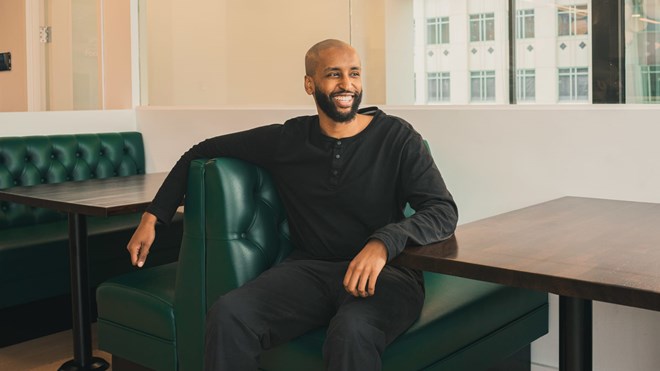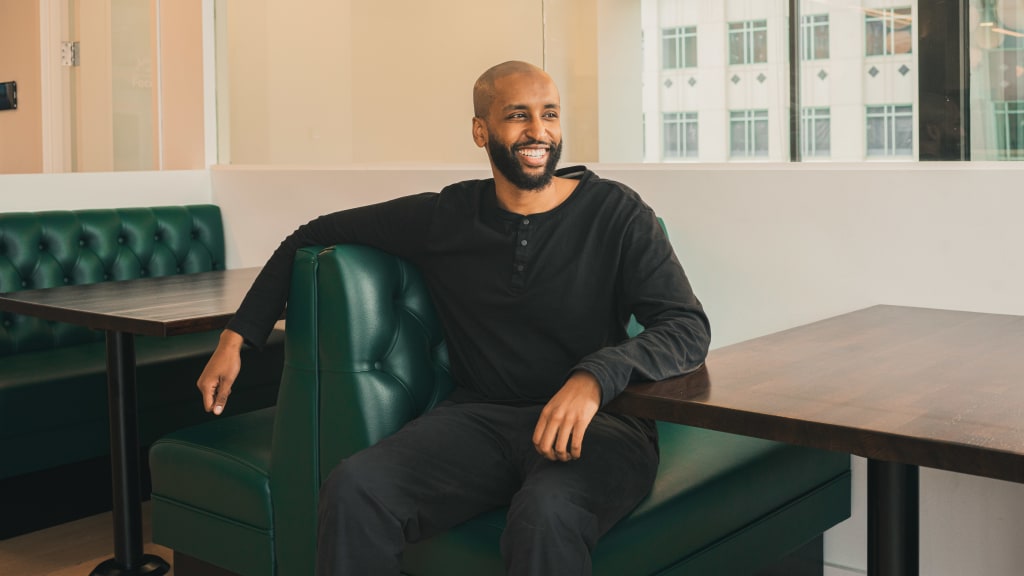Founder Mohamed Hussein steered his translation and interpretation company to $32.5 million in revenue

PGLS Founder & CEO Mohamed Hussein Photography by Greg Kahn
As a first-generation Somali American and the oldest of eight kids who grew up in a packed household in Northern Virginia, Mohamed Hussein, 32, has been honing his skills as an interpreter and an entrepreneur since childhood. He and his siblings would respond in English to his parents' Somali, and he was always running a hustle to earn pocket money. In his early 20s, he taught English and facilitated occasional livestock deals in Saudi Arabia, after which, in 2013, he founded PGLS (Piedmont Global Language Solutions), in Arlington, Virginia. The company, which recorded nearly $32.5 million in 2021 revenue, has 57 employees and provides translation, interpretation, and related services for those speaking more than 200 languages in 18 countries; it's a $60.5 billion industry. And to think that he almost became a doctor. --As told to Ben Sherry
I've always had that entrepreneurial mindset. I was the kid selling candy out of his locker and flipping cars before I could drive. I graduated from high school two years early, and started college before I was 16. I planned to go to med school, but decided to go to Yemen after my freshman year to study Arabic for a year. I ended up spending about five years in Saudi Arabia, studying Arabic, along with religion and philosophy, at a university there. That's where I became aware of language services as an industry--and a path for me.
I needed a job, so I started teaching English on the side. The elite schools in Saudi Arabia were spending a lot of money on English teachers. Eventually, I started a private tutoring business and began traveling around the country to teach English. That was when I started really making money--around $30 an hour.
Once I began making contacts in the language industry, I started getting offers to work on all types of projects, like book and website translations. I also worked with some major cattle importers in Saudi Arabia to help broker deals for sacrificial sheep and goats between the importers and the travel agencies representing American Muslims making the pilgrimage to Mecca.
When I got back to the States in 2013, I was sure I didn't want to be a doctor. I had just gotten married and was finally finishing up my degree, and also running an e-commerce platforming company, flipping real estate, consulting, and day trading. But I kept translating on the side. A friend told me about some contract work translating and interpreting Somali and Arabic, and that's how I originally founded the company--as an LLC for this side gig.
It wasn't until two years later that I thought, "There's something here. Let me double down and see what happens." It was then that the business really began to scale. I divested from most of my other commitments so I could focus entirely on growing PGLS. I'd been hiring contractors to handle translation work in languages I wasn't familiar with, and now I was able to hire my first actual employee.
Refocusing my efforts paid off immediately: In 2015, we jumped from making $34,000 to half a million dollars. It made sense to initially focus on winning government contracts because of our location, and we had steady growth from 2016 up until 2020. The pandemic was definitely a challenge, but we also won some big federal contracts and acquired a local language training company, resulting in 2021 being our best year ever, by far.
Our mission is to help organizations thrive in a global, multilanguage environment, so we work on everything from marketing materials to training manuals and website copy, but we also help government agencies translate foreign documents and provide linguists. Knowing whom to assign to a specific project is key, because they need to understand the context. If we're working for a health care company, the translator needs to understand the terminology as well as the language. Finding that mix of language mastery and knowledge of the subject matter is what makes our people so impressive.
I'm still keeping myself busy with side hustles, but mostly as a minority shareholder. At the same time, I'm trying to expand my own language knowledge. I'm fluent in English, Arabic, and Somali, but I'd like to have at least five languages in my back pocket, so I'm working on improving my high school Spanish and learning American Sign Language, which I think will be a major focus for us going forward. I know from experience that being able to talk directly with a client can go a long way in strengthening relationships.

 hiiraan.com
hiiraan.com

PGLS Founder & CEO Mohamed Hussein Photography by Greg Kahn
As a first-generation Somali American and the oldest of eight kids who grew up in a packed household in Northern Virginia, Mohamed Hussein, 32, has been honing his skills as an interpreter and an entrepreneur since childhood. He and his siblings would respond in English to his parents' Somali, and he was always running a hustle to earn pocket money. In his early 20s, he taught English and facilitated occasional livestock deals in Saudi Arabia, after which, in 2013, he founded PGLS (Piedmont Global Language Solutions), in Arlington, Virginia. The company, which recorded nearly $32.5 million in 2021 revenue, has 57 employees and provides translation, interpretation, and related services for those speaking more than 200 languages in 18 countries; it's a $60.5 billion industry. And to think that he almost became a doctor. --As told to Ben Sherry
I've always had that entrepreneurial mindset. I was the kid selling candy out of his locker and flipping cars before I could drive. I graduated from high school two years early, and started college before I was 16. I planned to go to med school, but decided to go to Yemen after my freshman year to study Arabic for a year. I ended up spending about five years in Saudi Arabia, studying Arabic, along with religion and philosophy, at a university there. That's where I became aware of language services as an industry--and a path for me.
I needed a job, so I started teaching English on the side. The elite schools in Saudi Arabia were spending a lot of money on English teachers. Eventually, I started a private tutoring business and began traveling around the country to teach English. That was when I started really making money--around $30 an hour.
Once I began making contacts in the language industry, I started getting offers to work on all types of projects, like book and website translations. I also worked with some major cattle importers in Saudi Arabia to help broker deals for sacrificial sheep and goats between the importers and the travel agencies representing American Muslims making the pilgrimage to Mecca.
When I got back to the States in 2013, I was sure I didn't want to be a doctor. I had just gotten married and was finally finishing up my degree, and also running an e-commerce platforming company, flipping real estate, consulting, and day trading. But I kept translating on the side. A friend told me about some contract work translating and interpreting Somali and Arabic, and that's how I originally founded the company--as an LLC for this side gig.
It wasn't until two years later that I thought, "There's something here. Let me double down and see what happens." It was then that the business really began to scale. I divested from most of my other commitments so I could focus entirely on growing PGLS. I'd been hiring contractors to handle translation work in languages I wasn't familiar with, and now I was able to hire my first actual employee.
Refocusing my efforts paid off immediately: In 2015, we jumped from making $34,000 to half a million dollars. It made sense to initially focus on winning government contracts because of our location, and we had steady growth from 2016 up until 2020. The pandemic was definitely a challenge, but we also won some big federal contracts and acquired a local language training company, resulting in 2021 being our best year ever, by far.
Our mission is to help organizations thrive in a global, multilanguage environment, so we work on everything from marketing materials to training manuals and website copy, but we also help government agencies translate foreign documents and provide linguists. Knowing whom to assign to a specific project is key, because they need to understand the context. If we're working for a health care company, the translator needs to understand the terminology as well as the language. Finding that mix of language mastery and knowledge of the subject matter is what makes our people so impressive.
I'm still keeping myself busy with side hustles, but mostly as a minority shareholder. At the same time, I'm trying to expand my own language knowledge. I'm fluent in English, Arabic, and Somali, but I'd like to have at least five languages in my back pocket, so I'm working on improving my high school Spanish and learning American Sign Language, which I think will be a major focus for us going forward. I know from experience that being able to talk directly with a client can go a long way in strengthening relationships.

How This First-Gen Somali American Turned His Knack for Languages Into a Go-To Enterprise Service
Founder Mohamed Hussein steered his translation and interpretation company to $32.5 million in revenue



